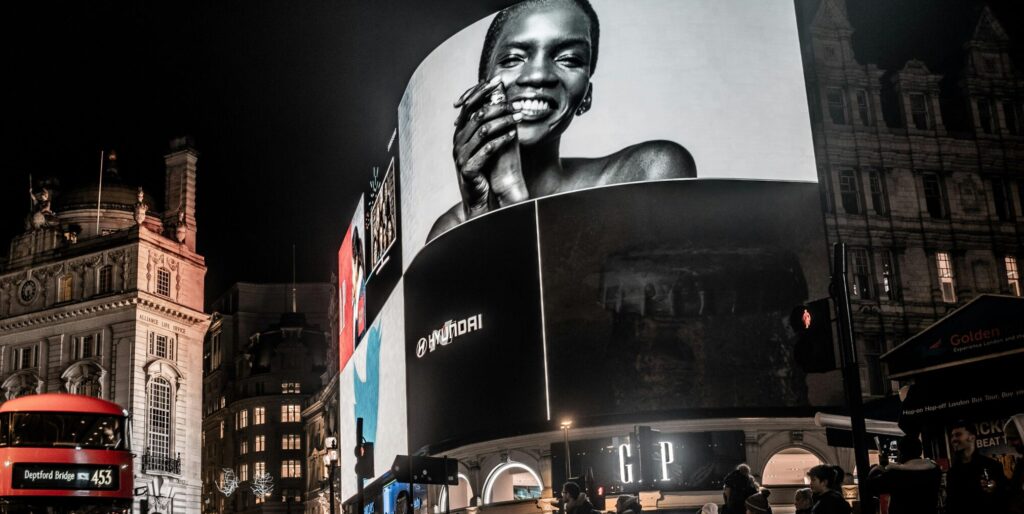Digital agencies typically act as a business’s outsourced digital marketing team, supporting strategies across email, social media, search optimisation, paid media, and more. Ultimately, a digital marketing agency is a team of experts that a company hires to help boost brand awareness, enhance customer engagement and improve its bottom line.
Since the COVID-19 pandemic, digital marketing has boomed. Lockdown conditions, for example, helped to push more consumers toward e-commerce, meaning that more people used digital channels to both discover new brands/services and to adopt new ways of engaging with brands they already buy into.
The UK’s digital marketing agency market has exploded since 2020, with compound annual growth for the industry sitting at 9.2%. This forecast is a steep curve – and as entrepreneurs, sole traders and small businesses start up, there is increased demand for expert help, and businesses that have a history of using agencies are exposed to much more choice than they had 3/4 years ago.
However, with this rapid change, many business owners are unclear about what they should pay for digital marketing agency services. Low barriers to entry and increased demand has led to an influx of self-proclaimed experts undercutting small/medium agencies and the cost of working with networks/groups are expected to grow 12 -15% vs 2023.
HOW AND WHY PRICING DIFFERS ACROSS DIGITAL AGENCIES?
The bottom line is that digital marketing agency pricing will differ depending on who you work with and the required services.
There’s a broad pricing spectrum as small, independent companies, for example, may charge much less than networks/groups.
However, this raises the question: should you invest in a relatively young firm and save money, or choose a longer-established agency at a higher financial risk? Or is there a middle ground?
What this choice doesn’t take into account is the additional factors that can change the cost regardless of the size of the operation, such as:
- The services you require
- The complexity of your needs
- Your current setup – do you have an in-house team or do you want to outsource completely?
- Expertise – who is to say smaller firms don’t have more skilled or experienced personnel?
You should also consider different pricing models; some agencies charge a flat monthly fee for retained work, others charge a % of media spend (common with large paid media contracts) and others might charge a day rate.
The costs that you will be presented with will likely vary depending on the specific services you need. Using paid search as an example, the price for management of a £100k per month Google Ads account across one market will differ from a multi market £1m per month spending account, the same applies to; SEO, content, design, etc.
PRICING MODELS BY DIGITAL AGENCY TYPE AND SIZE
Here are a few examples of agency types that you will find when shopping around for a digital marketing partner, alongside the average number of employees:
- Freelancers
- Small Independent (2 – 10)
- Medium Independent (10 – 50)
- Large Independent (50 – 200)
- Network/Group (200+)
Top down, using the list above, the price typically increases, as does the perceived area of expertise, relationships with media platforms, specialisms, etc. Roughly speaking, a freelancer might cost you a few hundred pounds per month to manage your media whereas a large independent could charge a few thousand, with a network working to a five figure minimum+.
Naturally, many brands perceive the increase in fee with an increase in expertise, output, better results, etc. However, this is not always the case, independents offer a level of personalisation and on some occasions, a ‘layer-free’ way of working that gives you a direct link to the most experienced staff vs a network that might offer minimal director face time as the account is run by juniors.
What does matter is the value you receive, something that’s not as straightforward to measure as rankings, ROAS, sales, etc.
WHY VALUE MATTERS
The overall cost of working with a digital marketing agency doesn’t always correlate with the quality of work or support you receive.
The value you get from a digital marketing agency and the rates they set depend entirely on your needs and targets. It doesn’t always correlate that the best-quality services or those that put the most time into your campaigns drive the most value. What’s more, the most expensive agencies aren’t guaranteed to give you the best results for your needs.
Companies often commoditise the services they need when looking for new partners, let’s say a brand wants to outsource their paid search and put out an RFI with the goal of finding an agency to; manage the budget, report back on performance and achieve targets. This takes conversations down the path of “this should cost £ x” and “we have budget £ x in mind”, which, when considering the types of partners available, isolates this to 1 (2 at a push) based on expectations (quality and fees).
Using this example, we need to consider the wealth of factors influencing paid search performance which were not part of the initial brief (landing pages, product offering, pricing, competition, etc), factors that more often than not wouldn’t be considered with a siloed paid search brief.
Where true value shines is when brands approach agencies (of all sizes) with their overarching goal, budget and how they want to get there. This allows the agencies to put a truly connected approach forward and for brands to see how each partner works, this may mean that a brand has to cut out more budget for a larger agency as the suggested approach makes sense, or, it may show that a smaller independent can offer a connected approach for a fraction of the budget.
Over the years we have seen the reputation of digital agencies change, over-promising and under delivering combined with next to no barriers to entry means that brands are faced with prospective partners charging lower fees to get work over the line, devaluing the services offered by true experts.
That said, it’s not all doom and gloom, trust in digital advertising is on the rise. Around 74% of small businesses now say they trust digital advertising, an increase of 24% since 2020. Additionally, 81% state that they believe it is important for success. What’s more, investment in paid-for digital marketing has grown by 4% to 64% during this period, indicating that the value agencies provide to businesses is becoming increasingly apparent.
TIMES ARE CHANGING
Working with a larger network or agency is not guaranteed to yield the best returns on your marketing investment. In fact, there’s no need to stick to one digital marketing agency alone unless you want to. Around 35% of businesses work with two different agencies for different areas of their marketing to take advantage of specific skill sets that can be executed alongside another partner.
Brands are in the position now where they have more choice than ever and with >7.5k agencies in the UK alone (2x the number there were 10 years ago). With this growth comes differentiation and a shift away from always needing to go to the biggest agency, giving more flex with the agency budget to collaborate with partners who can offer true value vs executing on a simple PPC/SEO brief.
What has (and will always) remain consistent is the ask for proof of expertise and success stories. The bigger agencies naturally have the A-list case studies and extensive brand portfolios, as you work through the list down to freelance support, you will need to truly qualify the work and ask for clear data references, examples, etc.
Also, when considering a partner, the industry/vertical experience is a great indicator for success, however, there may be a smaller agency who could absolutely execute on your brief but just haven’t had the opportunity to work in your sector yet.
SUMMARY
Ultimately, the average cost of hiring a digital marketing agency in 2025 will vary widely depending on the size of the company, the services it offers, and its pricing models.
Therefore, instead of taking an ‘average cost’ at face value, it’s likely to be more efficient to carefully gauge where your prospective agency sits on the broad spectrum of size and pricing.
Consider pricing models that fit your budget and the value you intend to get from your relationship. Try to break out of the commoditised approach to service-led agency partnerships (where possible), put your overarching goal forward, indicate budget/networks/channels and then let the agency feedback their holistic approach, you’ll be surprised what can be uncovered that may require more/less budget to get you where you want to be.
Be flexible about your budget as you grow, don’t let this determine the size of agency you look to partner with (especially for larger RFPs, speak to independents) and as always, do as much due diligence as possible – if it’s too good to be true it probably is and if you’re looking at a considerable fee for something largely straightforward, ask the questions.


